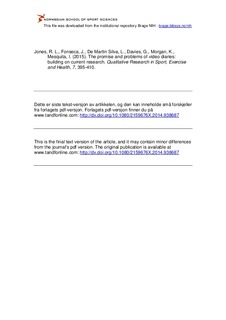| dc.contributor.author | Jones, Robyn | |
| dc.contributor.author | Fonseca, Joana | |
| dc.contributor.author | De Martin Silva, L. | |
| dc.contributor.author | Davies, G. | |
| dc.contributor.author | Morgan, Kevin | |
| dc.contributor.author | Mesquita, Isabel | |
| dc.date.accessioned | 2016-02-02T10:22:54Z | |
| dc.date.available | 2016-02-02T10:22:54Z | |
| dc.date.issued | 2014-07-21 | |
| dc.identifier.citation | Qualitative Research in Sport, Exercise and Health . 2014, 7, 395-410 | nb_NO |
| dc.identifier.uri | http://hdl.handle.net/11250/2375656 | |
| dc.description | I Brage finner du siste tekst-versjon av artikkelen, og den kan inneholde ubetydelige forskjeller fra forlagets pdf-versjon. Forlagets pdf-versjon finner du påtandfordline.com: http://www.tandfonline.com/doi/full/10.1080/2159676X.2014.938687 . In Brage you'll find the final text version of the article, and it may contain insignificant differences from the journal's pdf version. The definitive version is available at tandfordline.com: http://www.tandfonline.com/doi/full/10.1080/2159676X.2014.938687 | nb_NO |
| dc.description.abstract | The purpose of this paper was to further explore the use of video diaries as a research method. Specifically, the principal objective was to detail and deconstruct the use of video diaries in relation to some of the claims made on their behalf, particularly those related to participant voice, empowerment and spontaneity. The paper is presented through the illustration of a longitudinal case study into undergraduate sports coaching students’ learning and identity, in which video diaries were used alongside participant reflective logs and focus group interviews. Building on previous work, the findings give credence to an increasingly problematic conceptualisation of data derived from video diaries. Here, the claimed spontaneous and empowering nature of such diaries is questioned in light of the substantial role adopted by researchers to secure their production. The findings, however, also point to the realistic use of such methods which require careful consideration of context, and to being the principal, as opposed to a complementary, research means within any given study. | nb_NO |
| dc.language.iso | eng | nb_NO |
| dc.publisher | Routledge | nb_NO |
| dc.subject | qualitative methods | nb_NO |
| dc.subject | visual methods | nb_NO |
| dc.subject | video diaries | nb_NO |
| dc.subject | coach education | nb_NO |
| dc.title | The promise and problems of video diaries: building on current research | nb_NO |
| dc.type | Journal article | nb_NO |
| dc.type | Peer reviewed | nb_NO |
| dc.subject.nsi | Social science in sports: 330 | nb_NO |
| dc.source.journal | Qualitative Research in Sport, Exercise and Health | nb_NO |
| dc.description.localcode | Seksjon for coaching og psykologi / Department of Coaching and Psychology | nb_NO |
